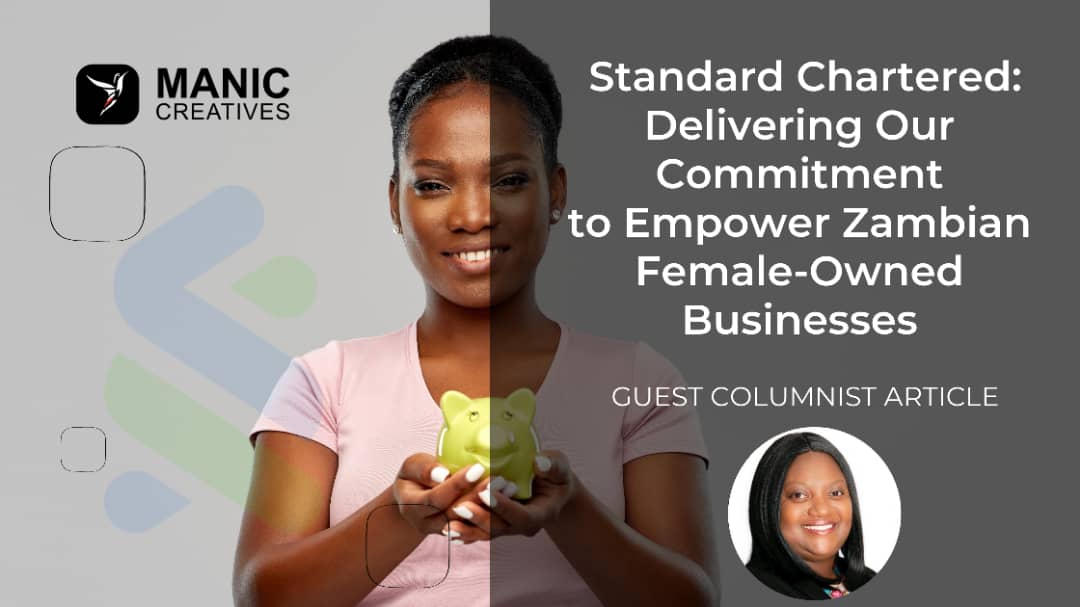Digitisation in a COVID-19 economy now an imperative…

By DeepPal Singh
LUSAKA: Due to the COVID-19 pandemic, financial sector players are facing business pressures and economic uncertainty, which poses an obstacle for executing complex digital transformations. At the same time, the pandemic has accelerated most banks’ digitisation initiatives. If the 2008 recession caused a boost in financial technology innovation, appetite for experimentation and a wave of fintech start-ups, then this time round it is more about delivering real change.
Insights derived from Standard Chartered’s ‘1Road to Resilient Growth,’ which is a series of action-oriented insights aimed at helping businesses build resilience, indicate that digital transformation is no longer an option, but an imperative.
The global pandemic has shown that digital will be central to interactions with consumers and corporates. Equally, the report states that achieving and maintaining universal digital access presents a potential private sector opportunity of $1.642 trillion in all emerging markets.
However, the potential opportunity is faced with hurdles that would require a mindset shift. Words such as ‘nimble’, ‘aggressive growth’, and ‘future-ready banking platform’ are usually associated with fintechs, which continue to disrupt the traditional world of banking. Digitising a legacy retail bank in its truest sense is a challenge that very few players have been able to solve. It requires an inflight change not just of technology, but of entrenched structural costs and legacy mindsets.
Organisational inertia is the main reason why many transformations stumble or falter. Igniting a culture of innovation and experimentation has been a critical focus, and possibly it has been more challenging to rewire mindsets than redeploy technology. This manifestation is seen in a dearth of internal expertise, budgetary constraints and lack of an overall digitisation strategy.
Another challenge that most digital banks are facing is the slow path to profitability. This is a multiple-year journey, but by aggressively cutting legacy cost while pivoting to exponential digital-led growth, the timelines to profitability can be brought forward.
To bring the issues into perspective, let me outline Standard Chartered’s journey towards digitisation, especially in Africa. Digitisation is one of the key items on the Bank’s transformation agenda, both regionally and globally. In turn, Standard Chartered has advocated the introduction of digital banking offerings across key markets in the Africa and Middle East (AME) regions to further reinforce its standing as a progressive, future-forward financial services provider.
The investment potential in Africa concerning digital access amounts to $74.5 billion, wherein the current access to digital stands at an average of 48%. Therein lies the opportunity for banking institutions.
Over the past three and a half years, the team at Standard Chartered Bank in Africa has tried to address the core issue that afflicts banking institutions – how to successfully and profitably convert a legacy international bank into a truly digital bank, using a standardised platform that is future-ready while also nimble enough to incorporate local flavours.
Inaugurated in Côte d’Ivoire in 2018, Standard Chartered rolled out the digital banks across eight additional key African markets, including Uganda, Tanzania, Ghana, Kenya, Botswana, Zambia, Zimbabwe and Nigeria.
Since inception, Standard Chartered’s digital-only banks have seen significant developments and marked several milestones. The onset of the COVID-19 pandemic in early 2020 served as further testament to the efficacy of the digital bank offering and resulted in a 50% growth in new customers and a subsequent 45% increase in wealth management offerings facilitated through digital channels.
The digital banks have also allowed us to attract a new audience of consumers, comprising a younger, digital-savvy demographic, with 75% of accounts having been opened by consumers below the age of 35.
To-date, the Bank has digitised over 70 of the most popular banking services, to now also providing enhanced services, including QR code and P2P payments, loan and overdraft facilities, instant fixed deposits and bancassurance solutions.
The demand for digital services was only further amplified due to the impact of COVID-19. By the end of July 2020, up to 50% of fixed income transactions were completed using our SC Mobile App. In addition, we saw a 250% increase in wealth management transactions booked between March and April, when COVID-19 first hit the African markets. In June, 2020 alone, product sales rose to an all-time high as a result of the increased accessibility through digital channels.
Digitisation has the potential to increase the financial inclusion of women by enabling them to access banking products and services from anywhere, at any time.
There’s a long way to go as Standard Chartered’s strategy plays out. But the early positive signs of our transformation in Africa could become a sound model for other banks to follow suit.
About the author:
DeepPal Singh is Head of Consumer, Private and Business Banking – Zambia and Southern Africa at Standard Chartered Wealth Management
Standard Chartered
Standard Chartered is a leading international banking group, with a presence in 60 of the world’s most dynamic markets and serving clients in a further 85.
Its purpose is to drive commerce and prosperity through its unique diversity, and its heritage and values are expressed in their brand promise, “Here for good.”
Standard Chartered Plc is listed on the London and Hong Kong Stock Exchanges.








